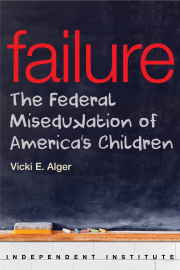Children are taught the value of perseverance. It’s a virtue, they are told, to keep working until the job gets done. But sometimes the opposite is needed: The candor to reassess and recognize when it’s time to throw in the towel. Since 2007, Congress has been debating whether to reauthorize the No Child Left Behind Act (NCLB), which was signed into law in 2002 by President George W. Bush.
Last week the House passed the Student Success Act, which attempts to restore more control over education to states, schools, and parents. It eliminates or consolidates dozens of federal programs in an effort to reduce the federal footprint and encourage a more “appropriate” federal role in education.
Rather than push ahead with reauthorization, Congress should retire NCLB and take a fresh look at government’s role in education.
NCLB is the eighth reauthorization of the Elementary and Secondary Education Act (ESEA) of 1965, which was a key program in President Lyndon B. Johnson’s War on Poverty. It directs federal funds to a variety of programs intended to improve education for disadvantaged students. NCLB was supposed to be different from previous reauthorizations because it mandates annual statewide testing for students and that test results for all student sub-groups be made public. NCLB requires “adequate yearly progress” (AYP) targets for student proficiency in reading and math, and penalties for schools and districts that fail to meet those targets.
According to NCLB, this coming year, for example, 100 percent of American public school children, regardless of income, race, disability, or native language, are supposed to be proficient in reading and math. No state is even close.
Rather than mete out the various penalties, the Obama administration has given 39 states waivers. It’s understandable why the Administration doesn’t want to punish schools for not meeting unrealistic education goals, but this waiver approach is flawed. The federal government should instead move to tackle the bigger problem of federal micromanagement of schooling by scrapping NCLB and returning local control over education to parents in states and localities.
Americans share the desire to ensure that all children receive an excellent education. But that doesn’t mean the federal government has the solution. In fact, NCLB—like most other federal efforts to dictate education policy—has proven a costly, confusing waste of time and money.
The administrative burden of complying with NCLB was an estimated 7.8 million hours at a cost of more than $235 million in 2011 alone. Worse, there is scant evidence that this expensive red tape has improved student learning. Achievement results before and after NCLB’s implementation show no appreciable improvement in students’ educational outcomes and no sustained narrowing of the achievement gap.
Results from the National Assessment of Educational Progress (NAEP) for 17-year-olds have risen just one and two points, respectively, in math and reading, since the early 1970s. Meanwhile, the average high school graduation rate remains stuck at around 75 percent—the same as it was in the mid-1970s, in spite of the many attempts from the federal government to improve education.
Nearly 50 years of failure is enough. There is no reason to believe that giving the federal government more time and more money will improve student outcomes. It’s time for a new approach.
First, Congress should prohibit any NCLB program from being reauthorized. All related program funding should be returned to the states with no federal strings attached—the most flexible plan of all.
Second, no piece of federal education legislation should be enacted until the U.S. Constitution is amended giving Congress express authority to pass education-related legislation. The president and his education secretary must stop bypassing Congress, unilaterally issuing waivers, and doling out taxpayer dollars for the administration’s pet policies, most notably Common Core national standards.
Finally, state lawmakers should enact and expand parental choice programs. Today, 250,000 students nationwide are benefiting from parental choice programs, up from 50,000 in 2001. Rigorous scientific research proves parental choice works; parental choice saves money; parental choice is constitutional; and, best of all, parental choice programs change children’s lives for the better.
Public policy should be based on hard evidence—not just noble intentions. NCLB has failed and may be hindering the state-level, parent-driven innovations that create real educational opportunities for all students.
Washington needs to stop tinkering with old federal education laws and recognize that getting out of the way and allowing taxpayer dollars to fund what works for each student is the best way to improve education throughout the United States.








